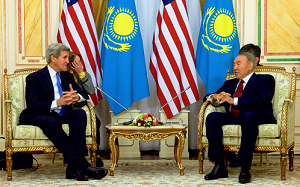Central Asia: An Opportunity for the Trump Administration
By Stephen Blank
March 22, 2017, the CACI Analyst
Central Asia has never ranked high on U.S. priorities. That is unlikely to change under the Trump Administration. Yet recent developments in Central Asia, particularly in Uzbekistan, do offer an opportunity to advance U.S. interests through a greater economic-political presence in the region, whilst also countering growing Chinese economic dominance and Russian efforts at military hegemony at a relatively low cost. The two key countries in this possible opportunity for the U.S. are Uzbekistan and Kazakhstan.

Uzbekistan between a new president and the same nation: is it perestroika?
By Farkhod Tolipov
January 10th, 2017, The CACI Analyst
On December 4, 2016, three months after the death of Uzbekistan’s first President Islam Karimov, the country held new presidential elections. The Prime Minister and acting Interim President Shavkat Mirziyoev became president-elect by defeating three competitors in a highly asymmetric campaign characterized by the utilization of so-called administrative resources. Yet Mirziyoev’s campaign was also an explicit demonstration of new domestic and foreign political trends in post-Karimov Uzbekistan towards more liberal reforms. The campaign also revealed rising new expectations on the part of the Uzbek nation after a quarter-century of one-person rule.
Uzbekistan-Tajikistan: game over, but what is the score?
By Farkhod Tolipov
December 15th, 2016, The CACI Analyst
Uzbekistan’s and Tajikistan’s independence in 1991 raised the Shakespearean “To be or not to be?” question concerning the ambitious construction of a dam on the mountainous Vakhsh river in Tajikistan, which would embody the Rogun Hydro Power Station. Uzbekistan – a downstream country – has permanently and vigorously rejected and resisted the project referring to numerous risks associated with Rogun for all downstream countries. Uzbekistan’s president has been the principal political antagonist of this project. Two months after his death in September 2016, Tajikistan’s president has decided to move on with the project.
Signs of improving relations between Uzbekistan and Tajikistan but tensions remain
By Edward Lemon
October 19th, 2016, The CACI Analyst
Since the death of Uzbekistan’s President Islam Karimov in early September, signs have emerged of a thaw in relations between Uzbekistan and its neighbor Tajikistan. In the years since independence, bilateral relations have been plagued by mistrust, disputes over water resources and outright hostility. Both sides have adopted a series of punitive measures against each other. Although acting President Shavkat Mirziyoyev has expressed interest in “resetting” relations with Tajikistan, any improvement will be tempered by the ongoing conflict over Tajikistan’s planned hydropower plants.
Putin-Xi meeting underlines Russian weakness faced with China's geoeconomics strategy
By Robert M. Cutler
August 28th, 2016, The CACI Analyst
On June 25, Presidents Vladimir Putin of Russia and Xi Jinping of China met in Beijing, immediately after spending two days together in Tashkent at a summit meeting of the Shanghai Cooperation Organization (SCO). The two countries’ industrial cooperation is dominated by the energy sector, where the several dozen agreements that were signed in Beijing confirmed that in bilateral economic and trade relations China is the agenda-maker and Russia is the agenda-taker. This relationship is now extending itself to the geoeconomic competition between the two in Central Asia and East Central Eurasia generally, as well as into Greater South Asia at a slower pace.







